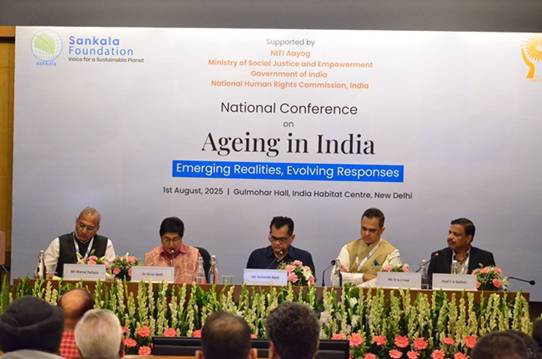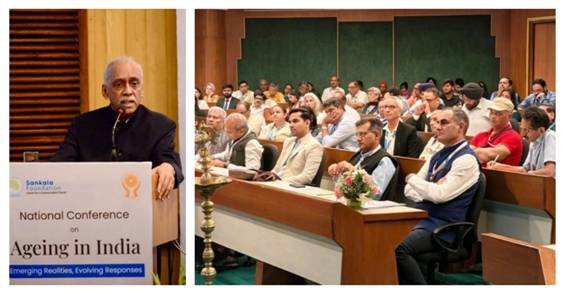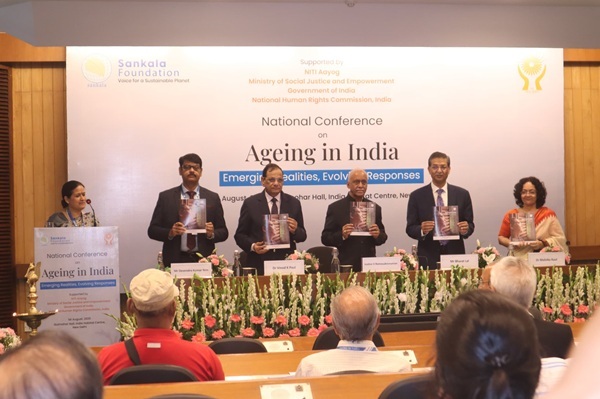NHRC Chairperson Justice V. Ramasubramanian Urges Fusion of Ancient Indian Values with Modern Policy to Uplift Senior Citizens
(Syed Ali Taher Abedi)
Delhi, 02, August, 2025- The National Human Rights Commission (NHRC), India, extended its support to a day-long National Conference titled “Ageing in India: Emerging Realities, Evolving Responses”, organised by the Sankala Foundation in collaboration with NITI Aayog, the Ministry of Social Justice & Empowerment, and the Ministry of Health and Family Welfare.
In his inaugural address, NHRC Chairperson Justice V. Ramasubramanian emphasized that India’s cultural heritage places deep value on compassion and respect for the elderly—principles that must guide modern policy frameworks.

He Further emphasised the need to integrate ancient Indian cultural values into contemporary policy frameworks to safeguard the dignity, rights, and well-being of senior citizens—core to NHRC’s mandate of promoting and protecting human rights.
In this context, Justice V. Ramasubramanian also drew references from the Sangam literature and the Yajur Veda. He called for the integration of these ancient values and principles into modern policy frameworks to ensure the dignity, protection and well-being of senior citizens, in alignment with the NHRC’s mandate to uphold human rights.
Underscoring the Commission’s commitment to protecting the rights of the elderly, he highlighted its various initiatives, including advisories, core group meetings, research studies and suo motu cognizance cases.

Echoing this vision, NHRC Secretary General Bharat Lal underscored the importance of treating ageing as a national asset and recommended the adaptation of successful international models—such as those from Scandinavia and Japan—into Indian policies, suitably tailored to the country’s unique socio-cultural landscape.
‘Ageing in India: Challenges and Opportunities,‘ for inclusive, sustainable elderly care released at the conference addressed by several eminent experts.
In his special address, Dr. Vinod K. Paul, Member (Health, Nutrition and Education), NITI Aayog, emphasised the importance of healthcare and social security frameworks for the ageing population. He said that empowering families to take care of their elderly should remain the foundation of India’s approach.
Before this, in his keynote address, the NHRC Secretary General, Bharat Lal setting the agenda of the conference said that India will have nearly 35 crore elderly people by 2050, when one in every five will be a senior citizen, posing a critical policy challenge.
He stressed the need to evolve family and community-based care models rooted in India’s family value system and supplemented by global best practices. He cited the NHRC Advisory on the Rights of Widows issued in 2024, which urged state authorities to ensure access to pensions, housing and healthcare for destitute and elderly widows.
He also recalled the NHRC Advisory on Protecting Older Persons during the COVID-19 Pandemic, which focused on equitable access to vaccination, home-based care, mental health support and protection from neglect or abandonment during lockdowns. Viewing elderly people as men and women of knowledge, experience and wisdom, Mr. Lal emphasised community-based services and inter-generational engagements for elderly care on the models of Scandinavian countries and Japan by adapting them to the Indian cultural context.
He called on stakeholders to study the report titled ‘Ageing in India: Challenges and Opportunities’ released in the inaugural session for inclusive and community-led healthcare and enable them to play a continued meaningful role in nation building.
Earlier, Devendra Kumar Nim, Director, Sankala Foundation, outlined the objectives of the conference. It was spread into four thematic sessions addressed by eminent experts.
These included ‘Strengthening Elderly Welfare: Policy and Practice’ chaired by Amit Yadav, Secretary, Ministry of Social Justice and Empowerment, ‘Health and Mental Wellbeing of the Elderly’ by Ms. Preeti Sudan, Former Chairperson, UPSC and Former Secretary, Health and Family Welfare, ‘Leveraging Ageing for Growth and Development’ by Mr. Amitabh Kant, Former G20 Sherpa, India and Former CEO, NITI Aayog and ‘Shaping Futures: Preparing for an Ageing Society’ by Dr. Vinod K. Paul, Member (Health, Nutrition & Education), NITI Aayog.
Some other eminent speakers were: Dr. Kiran Bedi, Former Lt. Governor of Puducherry; Amarjeet Sinha, Former Secretary, Department of Rural Development & Former Advisor, Prime Minister’s Office Mr. V. Srinivas, Secretary, Department of Pension and Pensioners’ Welfare; Mr. Manoj Yadava, former DGP, Haryana and DG Railway Protection Force, and former DG (Inv.), NHRC; HE Amb’r Lim Sang Woo, Charge d’Affaires, Embassy of the Republic of Korea in New Delhi; Vijay Nehra, Joint Secretary, Ministry of Health & Family Welfare; Ms. Preeti Nath, Economic Adviser, MEITY; Dr. Sanjay Wadhwa, Professor & Head, Dept. of Physical Medicine & Rehabilitation, AIIMS, New Delhi; Mathew Cherian, Global Ambassador for Ageing, HelpAge International; Dr. Manohar Agnani, Former Addl. Secretary, MoH&FW and Professor of Public Health, Azim Premji University, Bhopal; Professor T. V. Shekhar, International Institute for Population Sciences, Mumbai; Pavithra Reddy, COO, Vayah Vikas, Bengaluru; Mr. Jaydeep Biswas, Chief of Policy, Advocacy and Partnerships at UNFPA India; Mr. Asheesh Gupta, Founder and MD, Samarth Elder Care; Mr.Yudhistir Govinda Das, Director of Communication, ISKCON India, among others. The participants included senior government functionaries, member of academia, research organisations, startups, tech and healthcare companies, representatives of civil society, geriatric care and palliative care institutions, among others.
Some of the key outcomes of the deliberation were:
Better nutrition and improved healthcare have increased the life expectancy, resulting in a growing elderly population. This creates both challenges as well as opportunities for a developing country like India amid ‘ageing without affluence’.
Need to make ageing aspirational through early preparation, active and productive ageing, by adopting a lifestyle approach with investment from a younger age.
Technological advancements reduce labour-intensive work. However, efficiency and productivity are on the increase with the use of knowledge, skills and wisdom. It provides an opportunity to 60+ aged people to make meaningful contributions.
Need to provide more opportunities to elderly people, enabling them to continue making meaningful contributions.
Need for creating a competitive environment among states to improve elderly care, along with greater decentralisation, where local self-governments take on larger responsibilities.
Model programme like Kerala’s Palliative Care may be adopted for elderly care.
Ensuring financial security, digital literacy, long-term care insurance, digital healthcare, assistive devices and platforms for engagement are necessary for integrating the elderly into India’s ‘silver economy.’
The Indian model for elderly care and support must give primacy to family and community-led initiatives
The conference called upon all stakeholders, including government institutions, civil society organizations and the public, to actively engage in initiatives aimed at upholding the dignity and rights of the elderly population, thereby contributing to the establishment of a just and equitable society.




